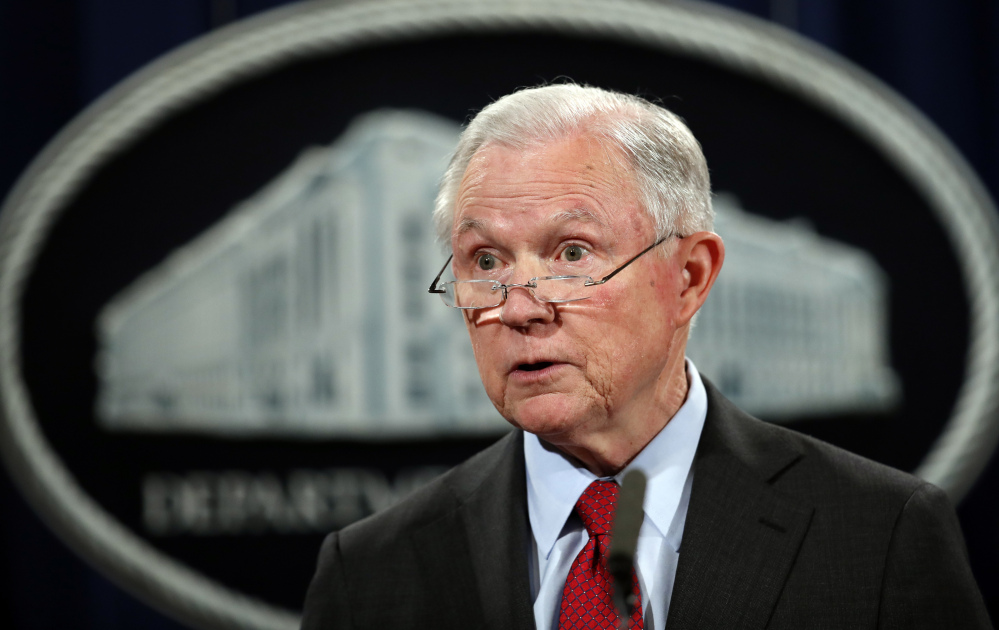U.S. Attorney General Jeff Sessions on Thursday rescinded the Obama-era policy that had paved the way for legalized marijuana to flourish in states across the country, a move that could throw Maine’s legal marijuana industry into a tailspin.
In a memo, Sessions announced a “return to the rule of law” and directed Justice Department attorneys to enforce the federal prohibition on the cultivation, distribution and possession of marijuana. He advised them to follow well-established prosecutorial principles when pursuing marijuana-related cases.
The memo rescinds Obama-era memos that protected states with legal recreational and medical marijuana programs from federal interference. Medical marijuana, however, continues to enjoy federal protections written into the last few national spending bills that prohibited the Justice Department from using federal resources to prosecute medical marijuana cases.
The department said Thursday it will not run afoul of federal law, including appropriations bill riders. It’s unclear whether Sessions’ action gives individual U.S. attorneys in states that have legalized marijuana, such as Maine, the flexibility to decide not to prosecute marijuana-related crimes.
In his public statement, Sessions said his decision returns local control to federal prosecutors who know best where and how to deploy federal resources, and gives them “all the necessary tools to disrupt criminal organizations, tackle the growing drug crisis and thwart violent crime.”
In Maine, the top federal law enforcement officer is U.S. Attorney Halsey B. Frank, who was nominated by President Trump and sworn in last October. In 2013, as the assistant U.S. attorney in Maine, he spoke out against a plan to legalize recreational cannabis use in Portland.
In an opinion column in The Forecaster, Frank reminded city residents that the federal law outlawing cannabis will always prevail in a conflict with state or local laws that legalize marijuana. He said society must draw a reasonable line on legal intoxicants.
“Maine’s medical marijuana law is not a defense to federal prosecution for manufacturing or distributing marijuana, and Portland’s ordinance won’t be either,” Frank wrote, referring to the 2013 referendum vote on a Portland legalization ordinance. “It may mislead people into trouble.”
City voters went on to adopt the ordinance to legalize possession of up to 2.5 ounces of pot for personal use. Three years later, state voters went further and adopted a law that allowed personal cultivation and a recreational retail market.
But the state has been unable to craft regulatory oversight for a legal recreational market in Maine. A special committee of lawmakers submitted oversight legislation in November that was passed by the Legislature but then vetoed by Gov. Paul LePage, a foe of legalized marijuana. The veto was sustained.
Lawmakers then met with the governor and others and resubmitted an amended marijuana law that had been scheduled for a Friday hearing before lawmakers decided late Thursday to reschedule it because of the snowstorm slamming Maine.
Committee chairman Sen. Roger Katz, R-Augusta, said the committee will continue its work, but he acknowledged that Sessions’ memo had created a “black cloud” that would hang over the future of legal marijuana in Maine until the committee had consulted with Frank.
OPPOSITION ‘NOT UNREASONABLE’
Frank was sworn in as U.S. attorney in the District of Maine after 18 years of service as an assistant U.S. attorney in that office and nine years as assistant U.S. attorney in the District of Columbia. The New York native received his law degree from Boston University in 1986.
In 2012, as assistant U.S. attorney in Maine, Frank successfully argued that drug use, including marijuana, made a Maine man ineligible to legally possess a gun. But that case doesn’t illuminate Frank’s position on marijuana as clearly as his newspaper column.
In that column, Frank, a Portland resident and former head of the city’s Republican Committee, elaborated on his personal opposition to recreational cannabis use. He believes that society can only tolerate a certain number of intoxicated people on its streets, at school, at work and at play.
“Where society draws the line between legal substances and illegal drugs will always seem arbitrary at the margin. But that doesn’t mean we shouldn’t draw a line,” he wrote. “At the moment, the line has been drawn at marijuana. That’s not unreasonable.”
On Thursday, Frank told the Portland Press Herald that he wanted to consult with his management team and evaluate how the new Justice Department memo might affect charging decisions in Maine.
“In the meantime, I will say that as a general rule, the U.S. Attorney’s Office for the District of Maine will follow long-established principles to prosecute federal crime, including to combat the current drug crisis,” he said.
Those principles include consideration of societal interests, national and local priorities, the nature and seriousness of the offense, and wise use of limited resources given probable outcomes and available alternatives, Frank said.
He also drew a distinction between his professional decisions and personal opinions expressed in a newspaper column.
“As the U.S. attorney for the District of Maine, I am a representative of the department whose job is to implement its policies,” he said.
REACTIONS TO POLICY CHANGE
National marijuana advocacy groups such as Marijuana Policy Project called Sessions’ decision “a federal crackdown on states’ rights” and “a direct attack on the will of the people” that could lead to federal raids on licensed, regulated and tax-paying businesses.
“The will of Maine voters is now under attack by the federal government,” said David Boyer, director of the Maine chapter of the Marijuana Policy Project. “Mainers that legally possess and grow marijuana could be charged and arrested by federal authorities.”
On Thursday, most Maine dispensaries were busy digging out from the snowstorm and calling their lawyers to find out what the Sessions memo will mean for them. Glenn Peterson, the co-founder of Canuvo dispensary in Biddeford, said it will be business as usual for him – for now.
“Our federal protections have always been paper thin, frankly, so I don’t think this will change things much in Maine,” Peterson said. “It falls to the U.S. attorney in each state and their appetite for going after us, and I think it’s just too well-supported by Maine citizens for our U.S. attorney to mess with.”
Peterson said he would support the government’s ability to prosecute “bad actors” hiding behind their state license, but would consider any decision to impede the legitimate medical cannabis or adult-use industry a mistake.
In Washington, Maine’s delegation also weighed in Thursday. Rep. Chellie Pingree, D-2nd District, said Sessions is meddling in states’ decisions.
“I hope the Justice Department will reconsider it’s one-size-fits-all approach,” she said.
Pingree has co-sponsored legislation to uphold state laws regarding marijuana legalization, clarify federal banking laws and end the federal prohibition on marijuana. She supported the Rohrabacher-Farr Amendment to congressional spending bills that bars the Justice Department from spending funds to interfere with state medical marijuana laws.
The Rohrabacher amendment must be renewed each fiscal year in order to remain in effect, and has been included in a series of spending bills in 2016 and 2017. The latest version of it, which is now the only federal protection left for medical marijuana, is set to expire this month.
Republican Maine Sen. Susan Collins was a leading champion of Sessions’ appointment, introducing the former Alabama senator to the Judiciary Committee for his confirmation hearing in January. In her speech, Collins called him a “person of integrity, a principled leader and a dedicated public servant,” as well as a friend.
On Thursday, a Collins spokesman, Christopher Knight, said Collins recognizes the medical value of “marijuana/THC” in certain cases, such as in helping to control seizures in children and pain relief for individuals with chronic conditions, and has thus supported the Rohrabacher amendment.
But she also is aware of the scientific and medical evidence of the negative effects, he said.
“There is considerable scientific and medical evidence of the detrimental impact that marijuana can have on the brain development of otherwise healthy teenagers,” Knight said. “Congress and the Department of Justice should review the Controlled Substances Act, which generally prohibits growing, distributing or using marijuana, in light of current medical evidence as well as actions taken by states.”
A spokesman for Maine Sen. Angus King, an independent, said King believes legalization should be left up to the states, and that he hopes Sessions “will revisit his decision and give each state the ability to implement policy that reflects the wishes of its citizens.” King voted against Sessions’ appointment.
FUTURE OF ADULT-USE POT UNCLEAR
Local marijuana advocates see a sliver of hope in the last sentence of Frank’s 2013 newspaper column: “If it’s going to be changed, it should be changed thoughtfully, democratically and legitimately.”
Marijuana advocates believe that is what was done through the 2016 referendum.
Legalize Maine, the group that wrote the voter-approved Marijuana Legalization Act, urged the Justice Department to avoid criminalizing and punishing those who possess small amounts of marijuana for personal use.
Its president, Paul T. McCarrier, said it was far too early to forecast the future of adult-use pot in Maine given Thursday’s announcement, but he noted that fear of a federal crackdown was one reason why LePage vetoed the legalization regulatory bill in November.
“If you read the governor’s veto letter, this is one of the things he was talking about,” McCarrier said. “He was concerned that people would invest in this new industry only to risk losing that investment to federal seizure. Unfortunately, it looks like that’s where we’re at right now.”
There is a lot on the line in Maine. In 2016, the state’s medical marijuana dispensaries generated $26.2 million in sales. A trade group that represents Maine’s 3,200 medical marijuana caregivers said they generated another $27.3 million in sales.
The commercial adult-use market isn’t operational yet, but a national research firm that specializes in the marijuana industry has pegged the size of a mature market here at almost $300 million annually. A typical retail marijuana store could be as profitable as a Starbucks, it concluded.
Local marijuana opponents such as the Maine chapter of Smart Approaches to Marijuana cheered Sessions’ action Thursday, calling it good for public health, and said it may be time for Maine to scrap its plan for retail adult-use sales and consider expanding the decriminalization model instead.
“This new guidance isn’t a green light to go after users of marijuana, nor should it be,’ said Scott Gagnon, chairman of the Maine chapter. “This is about preventing the next Big Tobacco from running amok in our communities. … In Maine, this means we should slow down.”
The Associated Press contributed to this report.
Penelope Overton can be contacted at 791-6463 or at:
poverton@pressherald.com
Twitter: PLOvertonPPH
Send questions/comments to the editors.





Comments are no longer available on this story